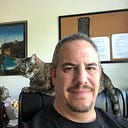Member-only story
There Are Many Tools of and for the Trade
AI is just another tool that’s not been fully defined yet.
Before the advent of the word processor, you had to rely on yourself and others to proofread your work.
Typos had to be sought out — and fixing them took white-out and repositioning the paper to retype your work. There was no backspace or delete for that.
When computers became more readily available, we got spellcheckers. That lovely tool in most (all, I think) word processing software that seeks out errors of spelling and typos. Still imperfect — spellcheck won’t see when you typed “the” but meant to type “they”, for example.
Artificial intelligence (AI) has been a staple of science fiction for a long time. It’s frequently represented as terrifying and a threat to our humanity and way of life — see Wargames, The Matrix, 2001: A Space Odyssey, and others.
As computer processing has improved over the past 50 years or so, we’ve begun to truly develop AI.
Most people don’t recognize the common and regular AI in their lives. Amazon’s Alexa, Google’s voice assistant, Apple’s Siri, and Microsoft’s Cortana are all AI. They grow and learn with use.
But AI needs human input, still. And frankly will for a long time to come.
